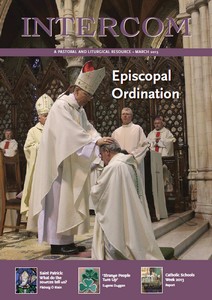 March 2013 issue
March 2013 issue
Click on link to view Intercom March contents
Editorial and Newsletter resources
Feature Article
‘Strange people turn up’ (pdf), describing the work of the Irish Chaplaincy in Britain.
‘Strange People turn up’
I have been reading Paul Elie’s book The Life You Save May Be Your Own, and came across a quote from Catholic writer Flannery O‘Connor which to me sums up how we approach our mission at the Irish Chaplaincy in Britain:
‘Charity is not understandable. Strange people turn up.’
With a 56 year history, first as an emigrant outreach of the Bishops of Ireland, and now as an independent Irish-supported British charity ministering to some of the most vulnerable, isolated and excluded of Irish emigrants, the Irish Chaplaincy continues to work with those who come to Britain looking for – but not always finding – a better life.
The ‘strange people’ who turn up (usually through letters or phone referrals) are the prisoners, Travellers and elderly Irish who face difficulties or discrimination. They may be regarded by some as strangers in Britain, even if they grew up here or worked here for decades. The Irish in Britain sometimes find themselves in a situation where their needs, especially those needs connected to their Irish or Catholic identity, are considered unimportant by local authorities and statutory services. We look at ways to help every Irish person maintain their dignity regardless of the circumstances.
And the “charity” we offer is not always understood. Why should we give money for phone calls to someone in prison? Why should we advocate for Travellers to be permitted to maintain their traditions? Why should we care where poor people want to be buried when they die? Rooted in our faith, we treat the stranger as a sister or a brother. We simply aid those in need because they have expressed their needs, regardless of how they may be seen by others.
The Irish Chaplaincy in Britain offers pastoral support that is culturally appropriate. We bring to the community an understanding of the issues these strange people who turn up are dealing with.
When I quoted Flannery O’Connor to the Irish Chaplaincy staff and volunteers, our prison project manager, Fr Gerry McFlynn, laughed and observed, “Strange people work here too.”
And indeed we do. Some of us born in Ireland; some of us the children of emigrants. We each come with our own stories and experiences of being “strange” in Britain. And we all choose to work with some challenging situations, finding creative ways to advance social justice for Irish emigrants.
Irish prisoners make up the second largest ethnic group in the prison system in England and Wales, and our casework involves prisoners scattered across more than 100 prisons throughout the country. Even with volunteers in several regions it is impossible to meet with each prisoner face to face as we would like. We work in partnership with the Irish Embassy to plan prison visits. We also work closely with the ICPO office in Maynooth, especially when it comes to supporting family members in Ireland to maintain contact with a prisoner, or when a prisoner wants to be moved to a prison in Ireland to be closer to family. Legal issues are not always the greatest need; it is often the small things that matter. Just knowing that they can phone us regularly to have a friendly chat can be important to the well being of prisoners faced with years of isolation from their community.
In 2011 the Irish Chaplaincy published Voices Unheard: A Study of Irish Travellers in Prison. This led to our Traveller project priorities changing from providing support on Traveller sites, to visiting Travellers in prison and encouraging them to celebrate their Traveller identity. We produced a poster about Traveller musicians and a series of post cards about Traveller role models. We are now developing a unique series of reading materials for Traveller men in prison who are learning to read. Low literacy among Travellers is a significant barrier to finding work. Improving literacy is a vital step in building self-esteem and developing effective Traveller leaders.
Our London-based Irish Chaplaincy Seniors project provides an outreach to those who came to Britain to help rebuild the country after the war. Many lost touch with family back home and have no family here, so our work revolves around reducing their isolation and making sure they access social care and healthcare. Some of the happiest moments occur when we are able to connect these seniors with long lost siblings back home. Our work can range from feeding the cat of someone in hospital, to tracking down a UN peacekeeping medal for someone who had served in the Congo. Ultimately our work with older Irish emigrants is about improving their quality of life and offering an Irish smile.
Our Catholic witness and Irish presence is a lifeline for the people we serve in Britain. The work we do with prisoners, Travellers and seniors is not always understood by those who do not share our journey of Hope. It can sometimes be difficult and emotional for all concerned, but it is, after all, a labour of love. At this time of the year we may be the only “strange people” to connect Irish emigrants with their culture by wishing them a happy St Patrick’s Day. And just that can mean a lot.
Eugene Dugan, Director, The Irish Chaplaincy in Britain
Intercom
Intercom is a pastoral and liturgical resource magazine published by Veritas, an agency of the Irish Catholic Bishops Commission on Communications.
There are ten issues per year, including double issues for July-August and December-January.
For information on subscribing to Intercom, please contact Ross Delmar (Membership Secretary):
Tel: +353 (0)1 878 8177 Email: [email protected]

